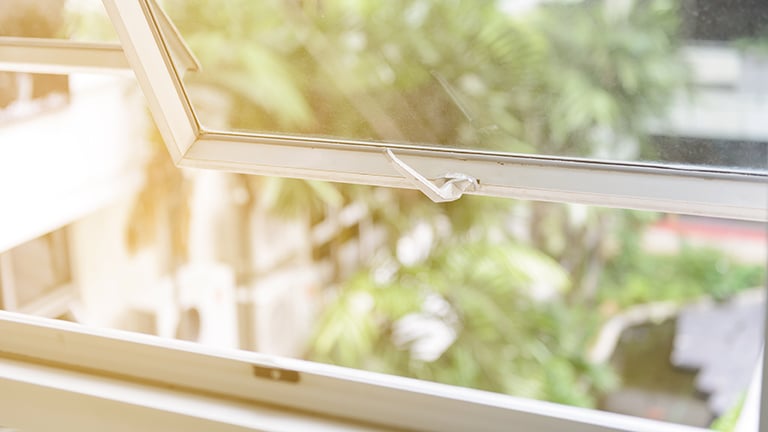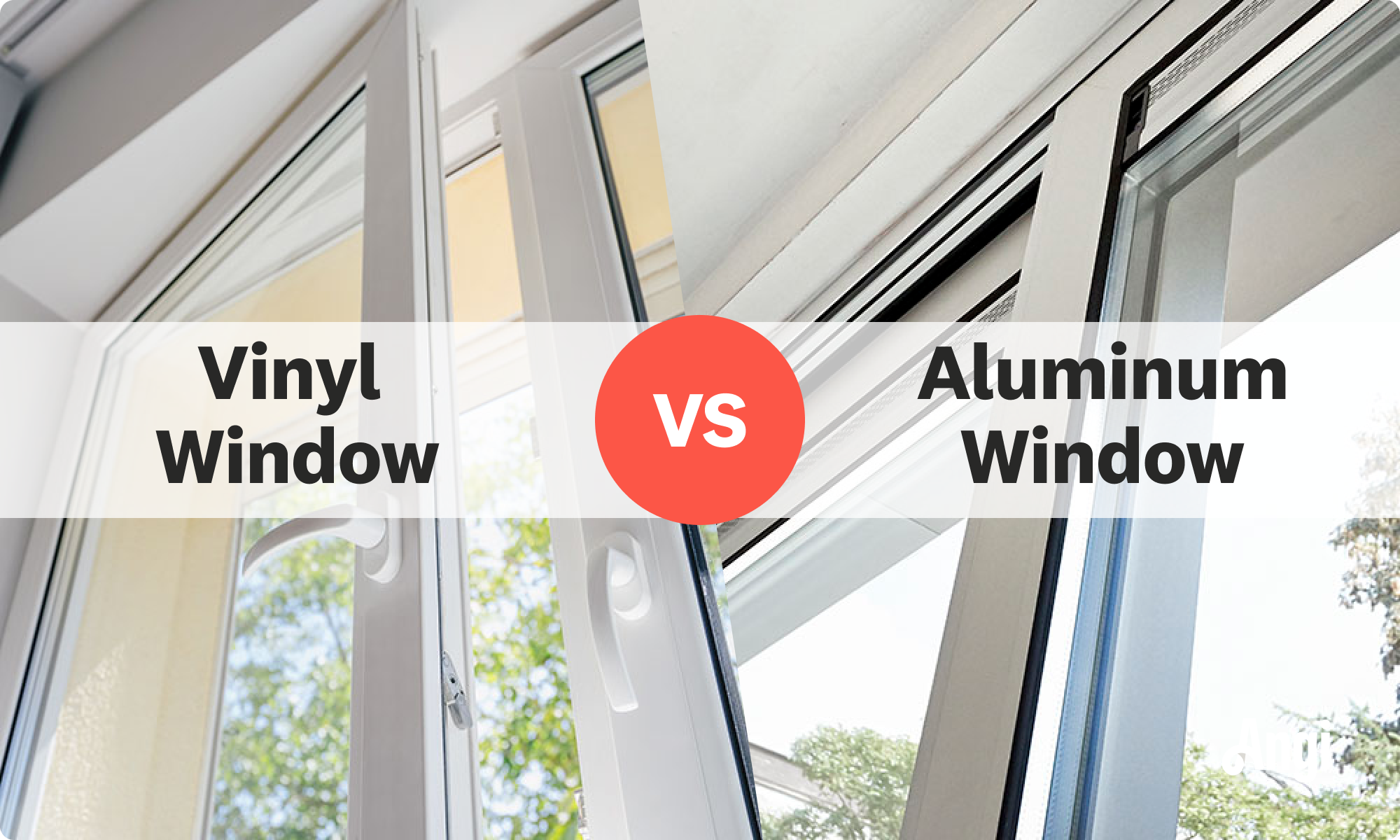Vinyl vs. Aluminum Windows: Which Should You Choose?
Find out which one is right for your home


Both vinyl and aluminum windows are low-cost and low-maintenance options.
Vinyl is an excellent insulator but is vulnerable to damage under extreme temperatures.
Aluminum is extremely strong, but it can easily scratch or dent.
Vinyl windows offer more options in terms of appearance, but they’re tricky to paint.
Aluminum is considered more environmentally friendly.
Replacing your home’s windows doesn’t have to be overwhelming or super expensive. Two of the most popular types of window frames are vinyl and aluminum. Both are affordable options that offer different benefits. Vinyl offers better insulation and energy efficiency, but aluminum stands up better to extreme temperatures and won’t fade like vinyl does when exposed to sunlight. Keep reading to decide which window type is right for you.
Vinyl vs. Aluminum Windows: Key Differences
There are many differences when it comes to aluminum vs. vinyl windows. Some of the most crucial to consider are window frame replacement cost, appearance, customizability, energy efficiency, and durability.
Vinyl windows are a bit more budget-friendly in terms of material cost, but they can cost more overall because they have a shorter lifespan. These windows often look nicer, can be customized to look like higher-end wood windows, and provide better insulation and energy efficiency for your home.
Aluminum is one of the most affordable window frame materials. It resists warping and fading more than vinyl in response to sun exposure. However, it can’t be made to look like higher-quality materials and is less insulative than all other materials.
What Are Vinyl Windows?
Vinyl windows have a frame made out of polyvinyl chloride (PVC). PVC is a lightweight and affordable material with decent insulating properties, making it a popular type of window frame.
Vinyl windows are durable and come in a variety of appearances, so they can fit many different home styles. But these windows do have some downsides, particularly when it comes to withstanding extreme weather.
| Pros | Cons |
|---|---|
| Lowest upfront cost | Costlier in the long run |
| More insulating | Warps and fades over time |
| Can emulate wood | Cannot be painted |
| Low maintenance | Shorter lifespan |
Best For: Boosting your home’s energy efficiency and saving you money upfront
Pros of Vinyl Windows
There are many benefits for homeowners who decide to add vinyl replacement windows. Some of the pros include the following:
Low up-front cost: Vinyl windows have a lower starting cost than aluminum windows, costing between $100 and $575 per window on average.
Low maintenance: Unlike aluminum frames, vinyl windows don’t tend to chip or need to be sealed or repainted over the years, so maintenance is minimal. Plus, the material is easy to clean.
Style: Vinyl can be made into various styles, even replicating the look of higher-end wood window frames.
Energy efficiency: Like wood, vinyl windows are highly energy efficient, minus the high maintenance that comes with wood. Because they offer better insulation than aluminum, vinyl windows can save you money on utilities in the long term.
Cons of Vinyl Windows
Vinyl windows aren’t perfect, though. They have some issues that homeowners should consider before installing them. Some potential problems with vinyl windows include the following:
More expensive long-term: While vinyl windows cost the least up front than any other window frame material, their shorter lifespan means you’ll spend more overall to replace them compared to aluminum windows.
Vulnerable to extreme temperatures: Vinyl may warp or crack with prolonged exposure to extremely high or low temperatures.
Can’t easily be painted: If you later decide the look of the vinyl color you chose isn’t your style anymore, you’ll likely have to replace the window frames. You can technically paint over vinyl, but the paint won’t last long.
Environmental impact: Manufacturing vinyl windows requires the use of many chemicals. To offset this issue, manufacturers may make recyclable vinyl windows to lessen the impact, but PVC is still less sustainable than aluminum.
What Are Aluminum Windows?

Aluminum windows have frames and sashes made from aluminum. Aluminum is a durable material, although it doesn’t have the greatest curb appeal. If it gets dented or scratched, aluminum can show damage more readily than vinyl.
| Pros | Cons |
|---|---|
| Low long-term cost | Higher up-front cost |
| Modern look | Prone to damage |
| Temperature and weather-resistant | Less insulation |
| Long lifespan | Shows damages readily |
| Susceptible to saltwater corrosion |
Best for: Homes in mild climates and homeowners looking to save money in the long run
Pros of Aluminum Windows
If you need some strong windows that look sleek, aluminum may be the right fit for your home. Some benefits of aluminum windows include the following:
Low long-term cost: Aluminum windows may cost more than vinyl, with prices ranging from $125 to $1,000, but they last significantly longer on average. They also cost less than other materials like composite, wood, and fiberglass.
Modern look: These windows have a contemporary look, ideal for modern homes or commercial buildings.
Temperature resistance: Unlike vinyl, aluminum is strong against extreme temperatures, so it won’t warp or crack in response to temperature changes.
Resistant to extreme weather and sunlight: Aluminum windows are popular in areas prone to storms and hurricanes because the material can withstand high winds. They also won’t fade in response to constant UV radiation exposure like vinyl will.
Cons of Aluminum Windows
Aluminum has some excellent qualities as a window frame, but it also has some features that make it less suitable for certain homes. Some cons of aluminum windows include the following:
Higher upfront cost: If you’re on a budget, aluminum windows can cost more on the spot compared to vinyl.
Prone to damage: Although they resist structural damage from strong winds and extreme weather, aluminum windows can easily dent and scratch upon impact.
Energy efficiency: Aluminum windows aren’t as energy-efficient as vinyl because they’re less insulating, so they are best for areas with mild climates.
Require some retouching: Because this material can scratch or rust easily, you may need to retouch it with paint or sealant from time to time.
Coastal corrosion: Aluminum windows are more susceptible to corrosion from saltwater, making them less suitable for coastal homes.
Vinyl vs. Aluminum Windows

The clearest difference between vinyl windows and aluminum windows is the material from which the window frames are made. Aluminum windows are made from aluminum, while vinyl windows are made from PVC, the same material used to create pipes, trim, siding, and fencing.
Outside of price, different window materials have different levels of insulation and energy efficiency. A window pro can guide you through the different features to pick the best option for your budget.
Cost: Aluminum Windows
When replacing your windows, expect to pay between $75 and $1,500 per window, depending on the material, brand, and service provider you choose.
A single aluminum window costs between $125 and $1,000 on average, while a single vinyl window costs between $100 and $575, depending on the size, quality, and style. Though vinyl windows cost less than aluminum up front, vinyl has a shorter lifespan than aluminum by around five to 10 years. You’ll spend more in replacement costs in the long run, making vinyl the more expensive option overall.
Appearance: Vinyl Windows
Both aluminum and vinyl windows can provide attractive window frame options. Aluminum windows have thinner frames and allow for a more modern aesthetic, while vinyl frames add a touch of modernity to an otherwise classic look.
Some companies manufacture vinyl windows with imprinted wood grain to make the material look like higher-end wood products. Aluminum doesn’t have these same options. While you can’t paint vinyl windows and you can paint aluminum, many companies offer colored vinyl frames for added customization.
That said, most homeowners prefer the appearance of vinyl windows over aluminum ones, especially given the customization options.
Energy Efficiency: Vinyl Windows
One major reason you may be considering replacing your window frames is energy savings. Replacing your windows can lower your utility bills and keep your home more comfortable.
While aluminum windows are stronger and last longer, the metal frames conduct heat. This means your home will hold more heat in the summer and cause your HVAC system to work harder. In the winter, the aluminum won’t insulate against the cold as well, either.
Vinyl still offers much better energy efficiency, so it’s the preferred option in both hotter and colder climates.
Durability: Tie
When it comes to vinyl vs. aluminum windows, both options are pretty durable. Vinyl may not be as great at withstanding extreme temperatures, but it won’t rust or dent like aluminum. Aluminum is vulnerable to corrosion, but it holds up against high winds, storms, and extreme temperatures better than vinyl. Ultimately, you’ll need to consider your climate when deciding which type of durable window frame you’ll need in your home.
Lifespan: Aluminum Windows
Aluminum window frames can last between 20 and 25 years, depending on the brand and the quality of the installation. Vinyl windows have a lifespan of between 15 and 20 years. If you’re unsure about the age of your current windows, you can talk to a window company near you to determine how much it will cost to replace your windows.
Maintenance: Vinyl Windows
While the up-front cost might be a sticking point for you, it’s not the only time you’ll spend money on your windows. When considering the cost of repairing damaged windows, the material can make a difference, too. Vinyl windows rarely need maintenance, while aluminum frames are susceptible to corrosion.
Aluminum windows may need to be repainted or otherwise maintained, which will cost a bit more over time. They’re still more affordable, but vinyl is the best option for low-maintenance window frames.
Environmental Impact: Aluminum Windows
In terms of environmental impact, aluminum is 100% recyclable with no loss of material integrity or quality. PVC manufacturing not only generates and requires chemicals that are harmful to the environment, but it’s not nearly as recyclable as aluminum.
Vinyl windows do improve your home’s energy efficiency, which should reduce your carbon footprint to some degree because you’ll use less electricity, oil, or gas to heat and cool your home. However, aluminum is still more eco-friendly than PVC due to its recyclability.
Styles: Tie
Most manufacturers of vinyl and aluminum windows offer an equal variety of window styles with frame options. These include double-hung and single-hung windows, picture windows, bay windows, skylights, and more.





- What Are Vinyl Windows? Your Guide to the Most Popular Window Frame
- Wood vs.Vinyl Windows: What’s the Difference?
- Vinyl vs. Composite Windows: What’s the Difference?
- Vinyl vs. Aluminum Fences: Pros, Cons, and Costs
- How to Choose the Best Replacement Windows for Old Houses
- Vinyl vs. Aluminum Soffit: Which Should You Choose?
- Vinyl vs. Fiberglass Windows: Which Should You Choose?
- Which Is Best for Your Home: Vinyl vs. Aluminum Gutters
- What Is Window Capping? How You Can Protect Your Windows for Years to Come
- Aluminum vs. Vinyl Siding: A Comparison Guide











